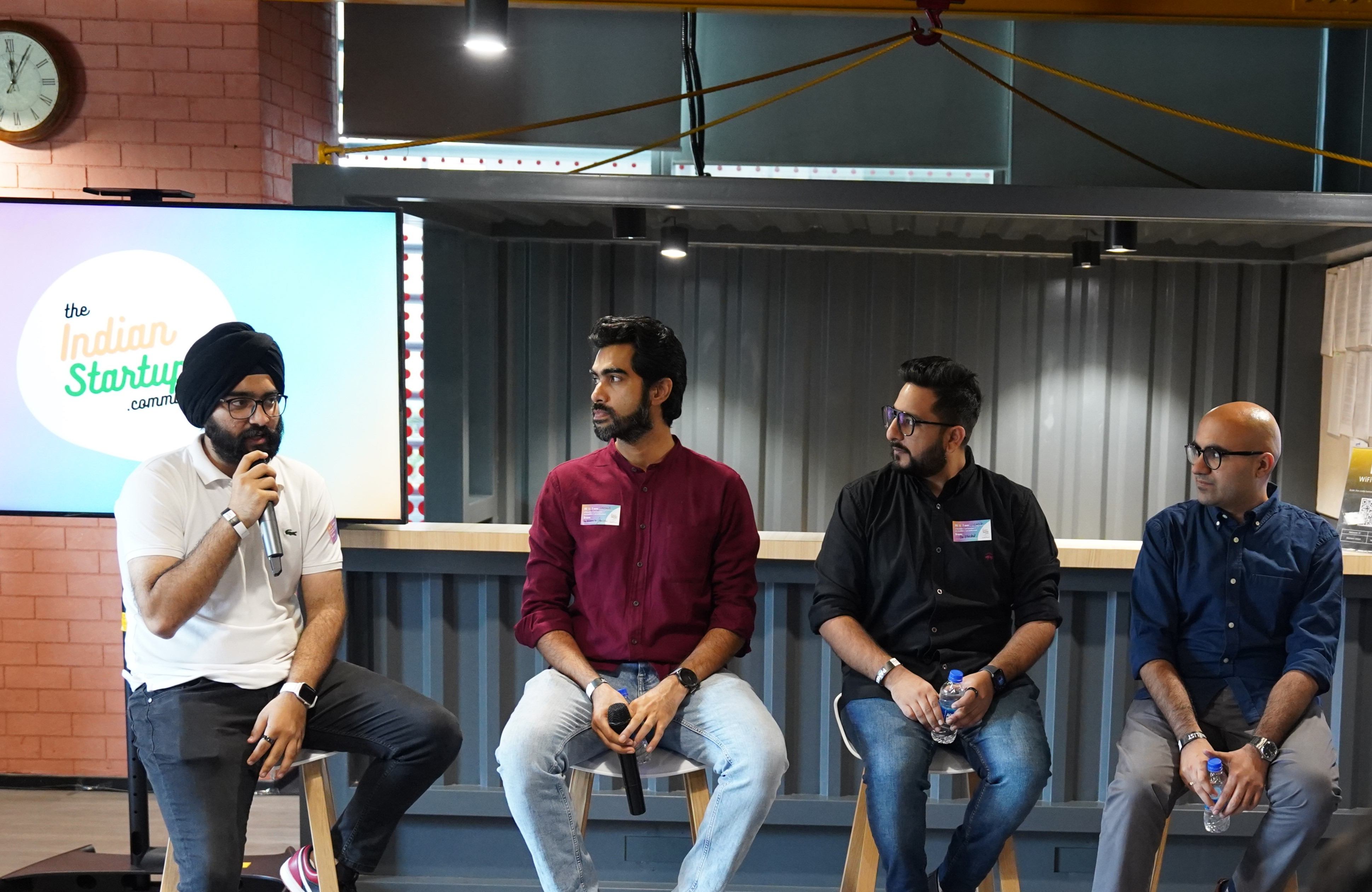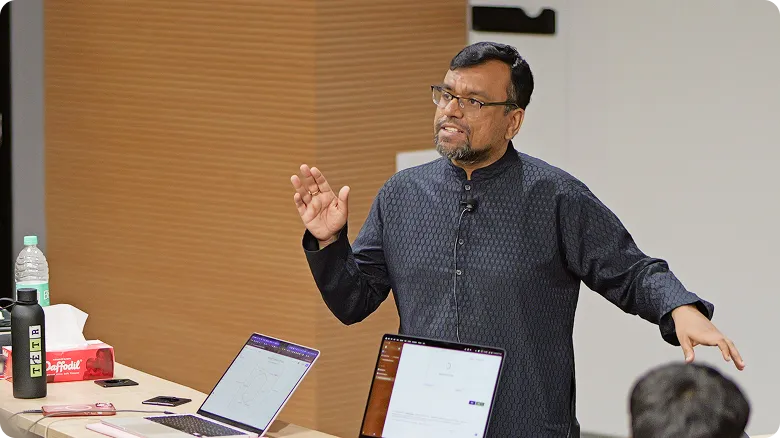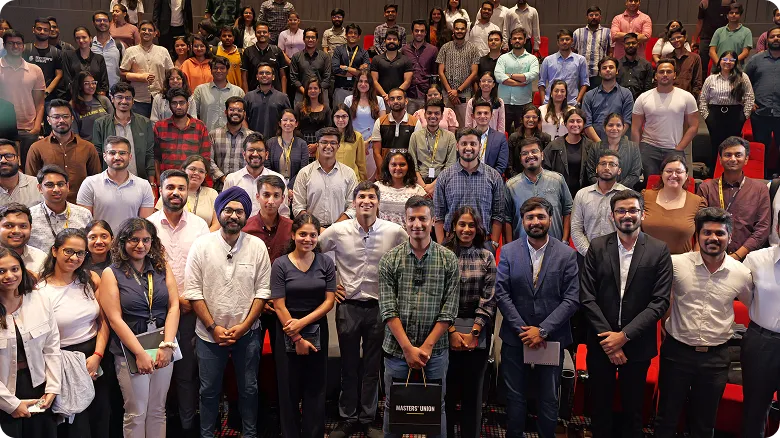Undergraduate
Undergraduate (Global)
Postgraduate
PGP in Technology and Business Management
PGP in Technology & Business Management
(Young Leaders Cohort)
PGP in Human Resources & Organisation Strategy
PGP in Sports Management & Gaming
PGP in Applied AI & Agentic Systems
PGP in UI/UX & Product Design
PGP in Sustainability & Business Management
PGP Bharat
Executive
Family Business
Careers
Innovations
Faculty
MU Ventures
Enterprise Education
Student Life
Jobs
Become a Master
events
For Companies
Blog
Business
Indian Startup’s Impact on Job Creation & Economy
February 11, 2025

India’s startup ecosystem has become one of the most exciting drivers of the economy. With over 100,000 startups, ranging from tech startups in India to e-commerce logistics companies in India, it’s not just about unicorns and billion-dollar valuations. Startups are powering job creation, innovation, and global recognition for India.
From big cities to smaller towns, the wave of entrepreneurship is creating opportunities, building new industries, and reshaping the way India works.
Let’s explore how startups are fueling jobs, boosting GDP, and changing the country’s economic future.
Startups as Job Engines in India
One of the biggest strengths of India’s startup ecosystem is its role in employment. Startups are creating jobs at a speed that traditional industries can’t match.
Government data shows that startups have created more than 2 million direct jobs and several million indirect jobs in just the last decade. This makes them a true backbone of modern India’s workforce.
Where the Jobs Are Coming From
-
Tech startups in India: Hiring engineers, developers, and designers
-
eCommerce & logistics companies: Creating jobs in warehousing, delivery, and supply chain
-
Fintech and Edtech: Offering opportunities in finance, payments, and digital learning
Quick Recap on Job Growth
-
Startups have already created millions of jobs
-
Employment opportunities are spreading into Tier-2 and Tier-3 cities
-
Entirely new job roles are emerging in tech and digital-first industries
The Economic Impact of Startups
The influence of startups goes far beyond hiring. They create a ripple effect that boosts many other industries. For example, when startups grow, they demand more office spaces, SaaS solutions, digital services, and logistics support. This builds a stronger business ecosystem.
They also attract global investors, leading to increased foreign direct investment (FDI) in sectors like AI, EVs, and blockchain. All of this contributes to a stronger GDP and innovation-driven productivity.
How Startups Boost the Economy
-
Higher GDP growth: Startups improve efficiency and drive innovation
-
Global funding: Attracting FDI across emerging sectors
-
Regional impact: Creating opportunities even outside metro cities
Quick Recap on Economic Contributions
-
Startups are fueling GDP with productivity and innovation
-
They bring in global capital through FDI
-
Non-metro regions are benefiting from expansion
Government’s Role in Shaping India’s Startup Ecosystem
The government has been an active supporter of startups, introducing startup policies in India such as Startup India, tax benefits, and simplified compliance processes. These initiatives make it easier for entrepreneurs to launch and scale their businesses.
At the same time, challenges remain. Many startups still face regulatory hurdles, infrastructure gaps, and funding difficulties. Founders need to strike a balance between focusing on innovation and meeting compliance requirements. On the other hand, professionals can benefit from government-led skill development programs designed to keep talent competitive.
Efforts of the Government
-
Startup policy India provides easier rules and tax incentives
-
Funding support is offered through government-backed schemes
-
Skill programs help young professionals stay job-ready
Quick Recap on Government Support
-
Startup-friendly policies are improving the business climate
-
Tax breaks and incentives reduce the burden for founders
-
Infrastructure challenges remain, but progress is ongoing
Future of India’s Startup Ecosystem
The next decade will see even bigger changes in India’s startup ecosystem. With technology, sustainability, and global expansion leading the way, the opportunities are limitless.
Emerging Trends to Watch
-
DeepTech and AI: Growth in robotics, biotech, and automation
-
Sustainable ventures: Startups building green and ESG-focused solutions
-
Global expansion: Indian startups entering overseas markets
Quick Recap on Startup Future
-
DeepTech will lead the next wave of innovation
-
Green and sustainable businesses will grow rapidly
-
Startups will expand their presence globally
E-Commerce Logistics: Powering Growth in Startups
The rise of e-commerce logistics companies in India is one of the strongest success stories of the startup world. With online shopping booming, demand for last-mile delivery, warehousing, and supply chain solutions has skyrocketed.
These companies are not only creating massive numbers of jobs but also helping businesses and consumers connect more efficiently. They are enabling faster deliveries, supporting small sellers, and driving retail growth across India.
Contributions of E-Commerce Logistics Startups
-
Expanding last-mile delivery to rural and urban regions
-
Creating thousands of jobs in logistics and supply chain
-
Helping retailers meet the demands of a digital-first market
Quick Recap on E-Commerce Logistics
-
E-commerce startups are central to job creation in logistics
-
They connect businesses and consumers more efficiently
-
The sector is growing rapidly with rising online demand
End Thoughts
India’s startup ecosystem is more than just a collection of unicorns—it’s a powerful force creating jobs, boosting GDP, and driving global recognition. From tech startups in India to e-commerce logistics companies in India, this movement is reshaping industries and opening up opportunities like never before.
With supportive startup policy India, global funding, and innovation at its core, the economic impact of startups will continue to strengthen India’s growth story. For entrepreneurs, it’s an era of possibilities. For job seekers, it’s a chance to be part of the future of work.
FAQs
1. How big is India’s startup ecosystem today?
It is one of the largest in the world with over 100,000 registered startups, making India the third-largest startup hub globally.
2. How are startups creating jobs in India?
Startups have created more than 2 million direct jobs in sectors like tech startups in India, fintech, edtech, and e-commerce logistics companies.
3. What is the economic impact of startups on India?
The economic impact of startups includes boosting GDP through innovation, attracting FDI, and driving growth in allied industries.
4. What government policies support startups?
Through startup policies in India such as Startup India, tax incentives, and simplified compliance rules, the government actively supports entrepreneurs.
5. Which startup sectors are growing fastest in India?
Startup tech companies, fintech, healthtech, edtech, and e-commerce logistics companies in India are among the fastest-growing sectors.
6. What challenges do startups face despite government support?
Regulatory hurdles, infrastructure limitations, and funding constraints remain challenges even with favorable startup policies in India.
7. What is the future outlook for India’s startup ecosystem?
The future looks promising with startups focusing on DeepTech, sustainability, and international expansion.

















